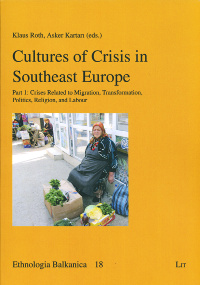“The End of History” Is a “State of Emergency”
“The End of History” Is a “State of Emergency”
Informal Constructions, Legalisation Laws, and the Production of Permanent Crisis in Post-Communist Albania
Author(s): Gerda DalipajSubject(s): Anthropology, Cultural Anthropology / Ethnology, Culture and social structure
Published by: LIT Verlag
Keywords: Albania; transition; property rights; legislation;
Summary/Abstract: This article addresses an important aspect of the crisis in post-socialist Albania: routinisation. Based on the concept of permanent crisis (Shevchenko 2009), I aim to discuss how conditions that are meant to be temporal become routinised and durable. I see crisis as essentially linked with the general experience of “transition” in Albania, both concepts – crisis and transition – being envisioned as temporary periods with a beginning in the past and an end in the future. Contradictory and ambiguous imaginaries on the “transition” affect the actions of social actors, sealing the success or failure of state-led reforms. I propose to call this the agency of the transition. Based on Pelkmans (2003) critique, I approach transition as a myth with two meanings: as a false version of things and as a blueprint by means of which people give meaning to their everyday experience. I suggest that the permanence of the temporal conditions can be grasped by tracing how ambiguity, alienation, and fissure are being produced in Albanian society. On the one side, through a poetical rhetoric of the temporary, a huge spectrum of international and local actors contribute to the construction of various states of emergency that are instrumentalised politically. The end of the transition becomes a “utopian object of impossible fullness” (Hartman 2007). On the other side, the common people project their expectations of security on “transition”, anticipating the future return of the state. But the latter has been, however, corroded by neo-liberal rhetoric and policy in post-socialist Albania and by the failure of the authorities to recognise the embeddedness of economic processes (Hann 1998) and state institutions and agents (von Benda-Beckmann et al. 2006). I will test this hypothesis using the case of the legalisation process for informal buildings in Albania. Why did the Law of Legalisation, prescribed as the medicine for the malady of disorder, incite a second mass of illegal construction in Albania? The findings are based on ethnographic fieldwork in an urban peripheral part of the town of Elbasan and a critical examination of Albanian public discourses and literature on the topic.
Journal: Ethnologia Balkanica
- Issue Year: 2015
- Issue No: 18
- Page Range: 207-226
- Page Count: 20
- Language: English
- Content File-PDF

